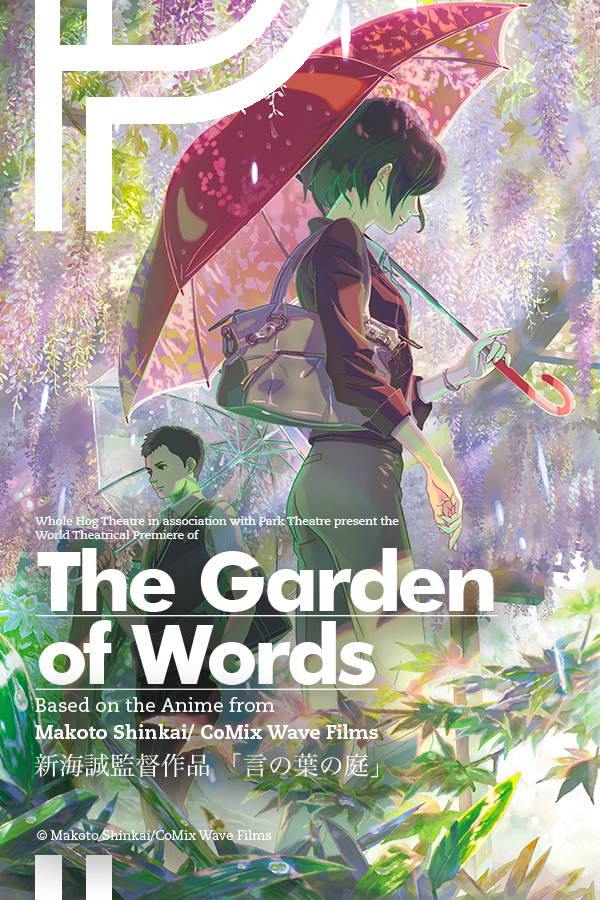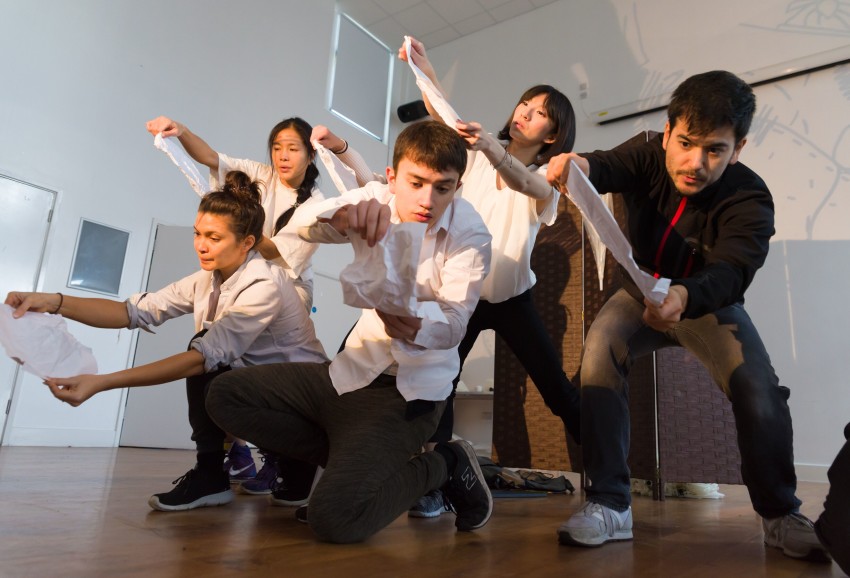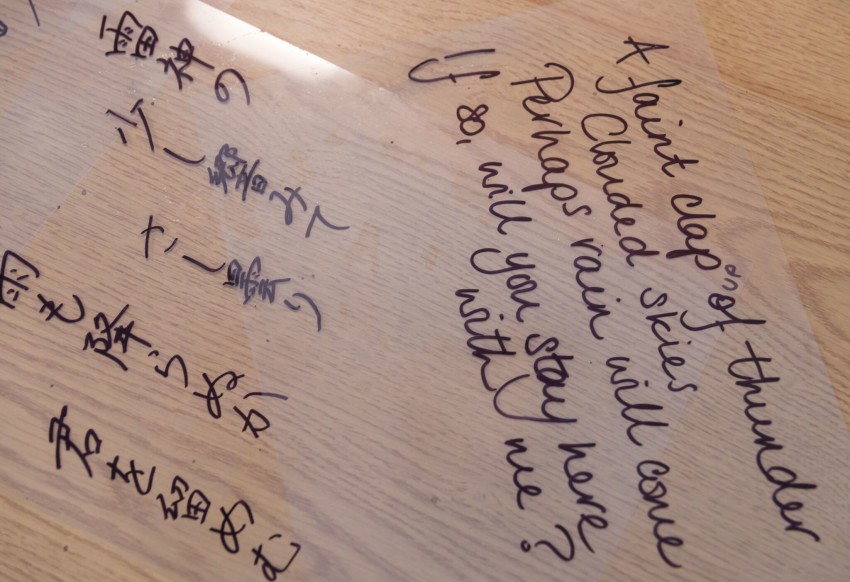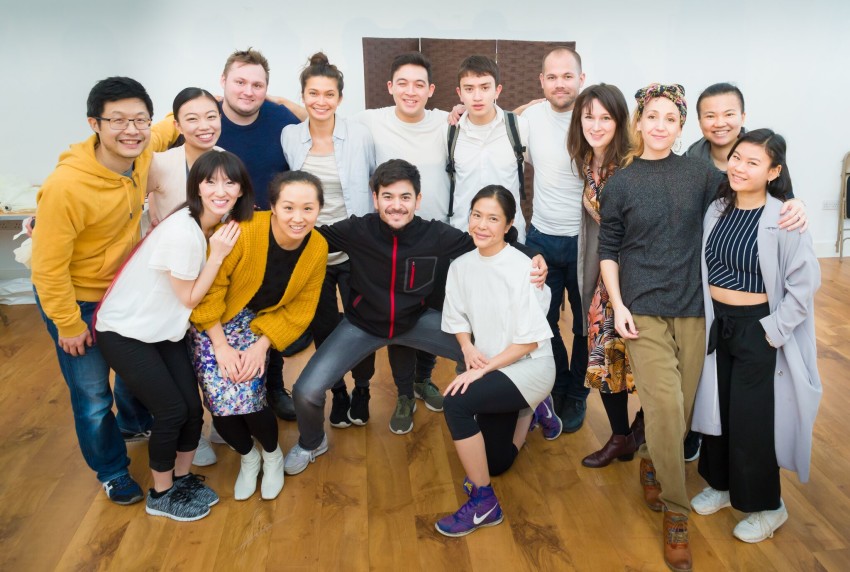Shinkai on Stage
January 18, 2020 · 0 comments
By Andrew Osmond.
 As Makoto Shinkai’s Weathering with You comes to cinemas, Andrew Osmond talks to director Alexandra Rutter about adapting Shinkai’s film The Garden of Words in a new stage play by the British company Whole Hog Theatre, which will come to London this summer.
As Makoto Shinkai’s Weathering with You comes to cinemas, Andrew Osmond talks to director Alexandra Rutter about adapting Shinkai’s film The Garden of Words in a new stage play by the British company Whole Hog Theatre, which will come to London this summer.
Why did you want to make a stage version of The Garden of Words?
I was so moved by the film. It deals with issues that are so important to explore in the ephemerality of theatre as well as on film. I felt the story could translate beautifully and powerfully to the stage. I wanted to challenge the stereotypes of what an anime is, and I’d never seen one that was so contemplative or with so realistic and honest a portrayal of Tokyo. I was also struck by the way the film expresses the nature of loneliness, especially in the age of social media and digitalised lives – which can create and compound feelings of isolation and anxiety as much as it can reassure and connect us.
 When we pitched this project we spoke to many London venues who were very interested but a bit confused about how an anime might translate to stage or have the emotional story to hold a theatre audience. I think the (non-fan) image of anime is that it largely deals with robots and science-fiction or is quite garish and not human-story based… but anime tells all sorts of stories.
When we pitched this project we spoke to many London venues who were very interested but a bit confused about how an anime might translate to stage or have the emotional story to hold a theatre audience. I think the (non-fan) image of anime is that it largely deals with robots and science-fiction or is quite garish and not human-story based… but anime tells all sorts of stories.
For that reason, I think The Garden of Words is a great choice for the stage. The story is so simple, human and heartfelt. We are all about challenging stereotypes, and bringing The Garden of Words to stage does this with regard to anime and Japan. We also want to make work that encourages a more diverse audience of people who might not normally come to the theatre. It’s a great opportunity to give a window on Japanese culture and Tokyo in particular. We’re going to be running in London at the time of the Tokyo Olympics, so if you can’t go to Tokyo…
What can you say about the process by which you contacted Comix Wave and got approval to make this play?
They knew of our work with Princess Mononoke [which Rutter and the Whole Hog Theatre company adapted in 2013, playing in London and Tokyo], and we took the same approach as we do with anything. We created a concept trailer which gave a visual window on how this would look and feel as a stage adaptation.
I proposed staging The Garden of Words about three and a half years ago, before Your Name was released. That’s really exciting; we feel blessed to have discovered Shinkai’s story then but to be able to work with it in a post-Your Name world where appreciation of Shinkai’s work has grown exponentially. I’m really excited to be working on something that’s more “classic Shinkai” and couldn’t be more grateful that the studio has given us permission.
Have you met Shinkai yet?
No, but we didn’t meet Miyazaki-san until after we did Princess Mononoke and this feels right to me; I’d like to earn it!
Can you say more about Nelke Planning, the Japanese production company with whom you are collaborating?
Nelke specialises in anime stage productions in Japan and has pioneered the 2.5D Musical Theatre genre. I would characterize that as somewhere between a Japanese pop idol concert and a western-style musical stage production, using a faithful adaptation style in which characters look as if they were plucked directly out of the animation, and specifically aimed at a Japanese audience. In contrast, what Nelke Planning and Whole Hog Theatre create together is a different style of anime on stage designed for both Japanese and Western audiences. It may have more changes in style, tone and character, rather than trying to accurately depict the original anime.

Has Nelke had input into the play?
They are funding the production, so they have had important input in various ways. But with regards to the creative work, they largely entrust this to us as they believe in our vision. They are very supportive and really interested in seeing how we might approach it creatively and indeed, sometimes differently from their other shows.
I think it’s really important, that it’s not just a British company in Britain adapting a Japanese piece; there’s a respected Japanese production team in Tokyo working together with us. They and their partnering companies will likely have more input in (the version of the play that will run in) Tokyo, as their expertise is in making work for Japanese people in the Japanese language. We very much value and respect that, but it’s a hugely collaborative process sharing different ways of approaching the play whilst respecting the original.
The first time you saw the film of The Garden of Words, did you identify with one character more than the other?
Yes, I really identified with Yukino, the female protagonist. It was interesting because I saw it almost as much from her perspective as I did from Takao’s, the boy, even though the film is very much told from his view, while she’s something of an enigma. I was really fascinated to explore her journey as much as his, and we hope to make it more of an even narrative, with both of them leading us through the story and getting to the heart of their loneliness.
The film opens with the boy going into the park; are you considering opening it differently?
Quite possibly. We threw a lot of ideas at the wall during our recent Research and Development (R&D) process to explore different ways to approach it. But yes, I have thought about opening it with Yukino, for example, giving you some context for who she is.
[Rutter explains the play’s content may also be derived from the Garden of Words novel that Shinkai wrote based on the film, which is not currently available in English.]

We hope that the play will explore at least three other characters. They’re Soichiro Ito (or Ito Sensei), Yukino’s ex-boyfriend and a teacher at Takao’s school; Shouko Aizawa, the girl who spreads rumours about Yukino; and Takao’s single mother. Of course, we are still in Research and Development so all of these ideas could change!
So your stage version will be longer than the film, and open it up?
Yes, that’s the idea. Fans of the film will still experience the film (story) pretty much intact, along with our interpretation of it, but then we also hope to explore the characters that you see in the book, all from Shinkai, which is fascinating.
The stage version of Princess Mononoke was performed in a very intimate space, which was important to the performance. Is that what you are aiming for with Garden of Words as well?
Yes, that was one reason we chose Park Theatre’s Park200 for the premiere. I love the space and the intimacy that an audience on three sides brings. The Garden of Words deals with feelings of isolation despite being surrounded by people. Park Theatre felt like a perfect space to encapsulate this feeling for the audience, and allow them to enjoy every complexity and nuance up close.
For the Princess Mononoke play, the audience feedback was that they loved how unexpectedly intimate it was and how it expanded out into the auditorium and immersed them within it. We hope to do something similar here. The Garden of Words is such a uniquely Japanese story with such global relevance, and it’s great to be in a theatre that embodies this in their reputation as a 5 star, neighbourhood theatre with global ambition. (Last year, the theatre staged the UK’s first British Vietnamese play).
When you adapted Princess Mononoke for the stage, you described realising how an image from the film could be adapted for the stage. Did you have a similar eureka moment with The Garden of Words?
Yes, the moment when Shinkai depicts a crow flying through the sky. I could imagine that crow representing all the things people want to achieve in their lives but feel they can’t; the threat of our potential, within a stage world where the crow and the garden are one big moving metaphor, a living painting.
Are you thinking of the play being largely centred round the park, like the film?
Yes. An early idea we are working with is to present the garden almost as a separate world, which is highly beautiful. The other spaces would be much more simple to create a stark contrast; the garden almost feels like a dream, while everywhere else reflects everyday mundanity. The garden is an escape for the characters because that’s where they connect with one another and find solace and feel understood, so it becomes even more beautiful to them than it really is. It would be great to try and capture the experience of the characters within the design.
Are you planning to make it a “universal” park setting, or a more specific park in Tokyo?
I really feel strongly about setting it in Tokyo, because I think that the cultural context is crucial to the characters’ whole experience. I also believe the themes are universal, regardless of where it is set, so there is no need to set it in a London or universal park to create familiarity. The piece wants to celebrate our similarities as humans, despite being in such a different culture.

Are you going to represent specific elements of the park in some way, such as the little pavilion, the bridge, the pond?
We don’t have a confirmed design at this stage, but it would be great to nod to some that, especially as the location in the film is such a detailed portrayal of a real place. We do want the audience to feel like they are in that exact spot in Shinjuku, Tokyo. However, I would also think we need a fluid design that can change location seamlessly so that, as in the film, the locations and the weather (rain) even become part of the storytelling as much as the characters. We hope to create something that evokes a moving canvas upon which the animation of bodies, puppets, lighting and projection can paint a story.
We’re exploring how to tell stories and express emotion through things like the design and movement, as much as the words. This is to reflect how, in the film, we hear so little of the conversations that happen and the characters never discuss anything “important,” but their interactions mean everything to them as people, and change them at pivotal moments in their lives. We want to explore the gaps in communication, what is not said, but is just as important.
Rain is so important in the film. What ideas do you have about getting the feeling of rain on the stage?
Lots! What will actually work best remains to be seen but we have discussed everything from creating the sound of rain live with the actors on stage, to using actual water at key moments. And you can do some amazing things with an overhead projector, a bowl of water and some straws… Sound design and music will also be crucial of course. So much of the magic of a Shinkai film is in how he captures emotion in the animation of the weather and the natural environment, so we hope to reflect this just as strongly in the play.
Shinkai uses very fast shot-to-shot editing. Is there any way to do an equivalent of that on stage?
Oh yes, I think so. Clever combinations of bodies in space, a non-static set and projection can all create a sense of speed and time passing. We came up with some wonderful and exciting stuff in R&D that we can’t wait to share. I think this combination can reflect the rhythm of the montages from the film. We can create a space without actually having physical objects – for example, conveying a train by how people are moving. That’s the magic of theatre.

What can you say about the actors?
When we ran auditions for R&D process, we had a fantastic turnout; over two hundred people applied. We are specifically working with British performers of Japanese or East Asian heritage, or Japanese performers, in order to accurately reflect the Japanese characters. It’s really exciting to see so many new faces in that community. One of the production’s aims is to encourage a diverse audience of not only regular theatre-goers but anime fans, the London Japanese and the British East Asian communities too.
The show will run in Tokyo as well as London. Will the Tokyo show have different actors?
The plan is there will be mostly if not entirely different actors (we hope to have at least some crossover in cast), because of the language change and because the production models are so different between the UK and Japanese industries. There will probably be some very well-known performers in the Tokyo show so watch out for that announcement! But in the UK, we will mainly be working with emerging artists, as is the remit of Whole Hog Theatre. The shows are sister shows, so you’ll have the UK production in English with British-Japanese/British-East Asian and Japanese cast, and the Tokyo show in Japanese with a Japanese cast.
The Garden of Words will be playing at Park Theatre, Finsbury Park, London from 16th July-15th August 2020. Tickets from just £18.50 are available online or via the Park Theatre Box Office on 020 7870 6876. Photographs by and © Geoff Wilson.
Alexandra Rutter, Andrew Osmond, anime, Garden of Words, Japan, Makoto Shinkai, Whole Hog Theatre
Leave a Reply